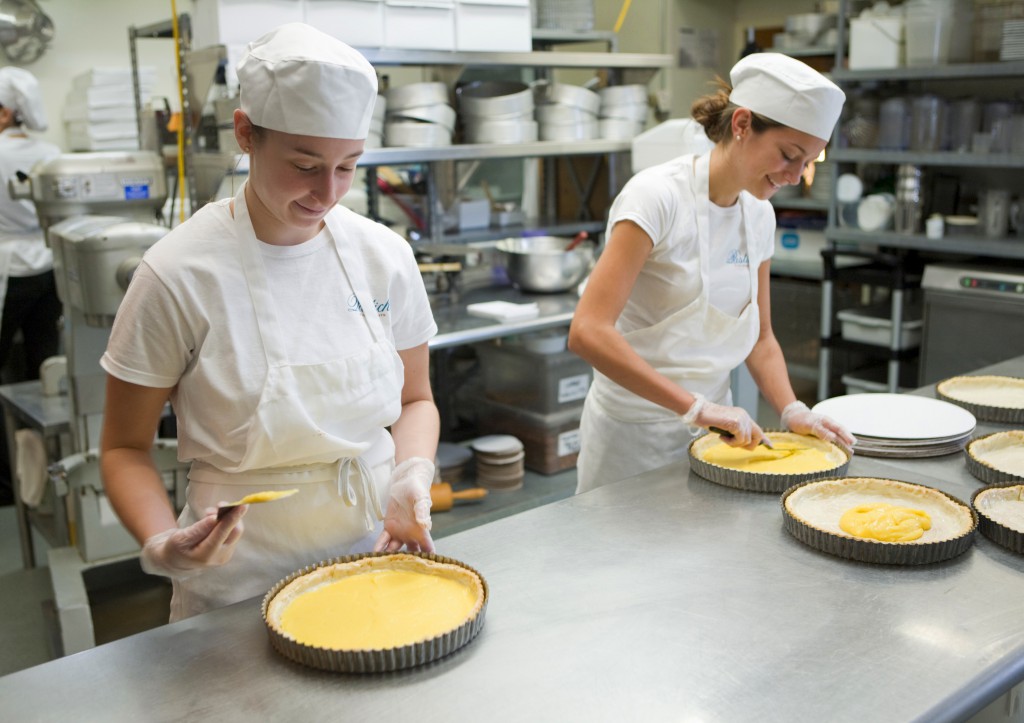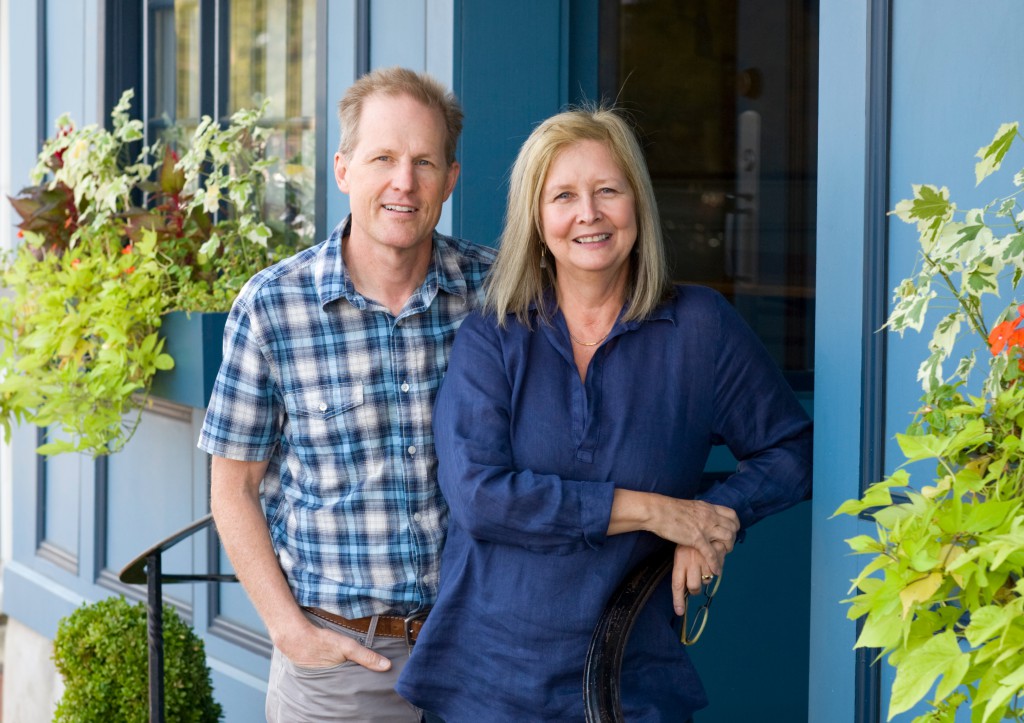IN THE EARLY YEARS of the Providence Renaissance, well before the food craze took hold, former owners Eileen Collins & Brandt Heckert started a fledgling business providing up-and-coming restaurants with their homemade desserts. With no formal training beside a shared love of food, an artist’s eye for detail, and a youthful enthusiasm for the work, they persevered. Their approach was simple: offer the best quality and deliver it consistently. The response was overwhelmingly positive, so in 1983 they opened a small shop and café on historic Federal Hill.
FOUR DECADES LATER. The dedicated staff and new owner Amy Foster, who has been with the company for 30 years, continue to uphold their philosophy. Still offering classic recipes made with the best natural ingredients, along with gracious service. And as when they began, the desserts are still handmade in-house, from scratch.
Although we no longer have café service, this European-style shop, continues to promise the best desserts!
Get in Touch
Reviews & Press
Boston Globe Article Excerpt
RACHEL TRAVERS
 The tiny, stylish shop called Pastiche, the Fine Dessert Bakery and Café, is tucked into a side street around the corner from the cobblestone plaza of Federal Hill, the Italian neighbor hood here, near inviting restaurants and a poultry shop with live chickens in the back.
The tiny, stylish shop called Pastiche, the Fine Dessert Bakery and Café, is tucked into a side street around the corner from the cobblestone plaza of Federal Hill, the Italian neighbor hood here, near inviting restaurants and a poultry shop with live chickens in the back.
Owned by Brandt Heckert and his wife, Eileen Collins, Pastiche looks brand new, but it’s been here for 20 years. From the outside, in the daylight, you see layered shades of celadon on the storefront, its picture-perfect window boxes brimming with spring flowers.
But if it’s night- particularly a mild weekend evening- you won’t be able to see the shop because of the throngs of people. Students and senior, families and theatergoers chat casually on the sidewalk as they wait up to a half-hour to get one of the 30 seats inside. The shop might serve 300 people on a busy night.
Pastiche is everyone’s favorite pastry shop. It has a sophisticated feel, the case looks like a Parisian patisserie with its tarts and cakes. No one has taken a single shortcut to produce these goods. Because Pastiche offers no meals- not even a bowl of soup or a sandwich-it’s unlike any place in Boston.
“It’s the closest thing to a café in Europe,” says Erin Luther, assistant to the head of Johnson and Wales University baking and pastry department. “I love it because of their assortment and the quality of the product.”
Kim Moore, co-owner of Boston Finale, a dessert restaurant, agrees. “They have a beautiful product,” she says, and “a great reputation.” When Moore and her partner, Paul Conforti, were students at Harvard Business School, they did a case study on bakeries and cafes that included Pastiche.
The shop name means potpourri or patchwork, a word used for literary styles and musical compositions made from bits of various selections. Heckert, 45, and Collins, 42, liked the sound of the word, its lilt, and its connection to art. They created their business like a pastiche, with recipes that were borrowed and adapted from a number of places.
Pastiche’s attractions sit in two glass display cases. A large, fresh fruit tart is topped with slivers of ripe mango, raspberries, and strawberries on a bed of vanilla custard. The shell is crisp and buttery. It looks as appealing as spring and tastes smooth and silky. Heckert uses lots of free-range eggs from Stamp Farms, which is nearby. The heavy cream from Christensian’s Dairy, a small farm in North Providence, has 38 percent butterfat.
Keeping company with the tarts are cakes – primarily American classics that include the couple’s signature carrot cake, chocolate layer cake, lemon velvet cake, chocolate mousse, and coconut angel cake.
Among the tortes there is a chocolate hazelnut torte and a mascarpone torte. Many of the cakes are made with sponge layers, which makes them light and airy. The only leavening in these sponge-based cakes comes from beating air into the eggs; they contain no other fat. All the confections are sold whole or by the slice.
A smaller display case houses some typical American sweets – wild blueberry muffing, walnut currant rugelach, dark chocolate cream cheese brownies, chocolate chunk cookies, and walnut currant scones.
There are also almond biscotti and more rustic desserts reserved only for customers who eat at the tables. Blackberry almond cakes is one of these, made individually with almond paste and fresh blackberries. Mango coconut shortcakes is a favorite. Hand-formed apple tarts just came off the menu, peach tarts are going on soon.
The menu rotates seasonally. Freshness is what Heckert and Collins emphasize. Fruit tarts not sold the day they’re baked are offered to the Rhode Island Food Bank.
It’s a repertoire that seems deceptively simple. Even Heckert admits “the pastries taste better than they look”-and they look beautiful. He and Collins stumbled into pastry making with no formal training, but a shared love of food, artists’ eyes for details, and good business sense.
“The end of life and the beginning of Pastiche,” Heckert says, began in the early 1980s. He was a weekend butler and a personal assistant to a wealthy Edgartown businessman. Collins was eking out a living as a waitress at Providence’s 3 Steeple Street restaurant.
The couple met on the island of St. John and soon Heckert began spending his weekdays in Providence. When the baker at 3 Steeple Street quit, Collins asked the owner Brian Kenner if she could try her hand at desserts.
That job evolved onto a small wholesale business run out of Collins’s apartment. “It was youthful enthusiasm mixed with desperation,” says Collins. With Heckert by her side and a recipe for carrot cake from her roommate, the two began baking for 3 Steeple Street. (They learned recently that the carrot cake, in fact, which launched them, had originally come from Kenner.) The business expanded to include other restaurants.
When Collins’s roommate couldn’t stand the baking anymore, the couple moved the operation to Warwick, R.I., where Heckert’s mother, Barbara, lived. With one oven, the two could turn out only four cakes. Heckert would deliver them to restaurants just before the customers arrived.
Each day Barbara Heckert, who passed away two weeks ago, would come home from her dental hygienist’s job and help clean the flour-strew kitchen, make dinner for all of them, and give them a hand with the late-night baking sessions.
It was her loan, combined with one from William Collins, Eileen’s father, that allowed the bakers to rent a small storefront space on Spruce Street off Atwells Avenues – the only place they could afford. How could they know that the area would become fashionable?
The business was strictly wholesale, but profit margins were low and the bakers couldn’t control the presentation of their desserts once they left the shop. After a year, they started selling cakes to retail customers, then gradually phased out the wholesale part and expanded next door to make the café.
One wall is covered with a mural painted by Rhode Island School of Design grad Allison Newsom, which looks like a European Seaside town. The kitchen in the rear is just 400 square feet. About 60 percent of the business is carryout. Thirty people work at the bakery (they wear soft chef’s caps), and there are always several workers handling the crush at the front counter.
Johnson and Wales’s Luther says that the university sends its students to Pastiche to taste the confections. Some students like them enough to apply for a job.








